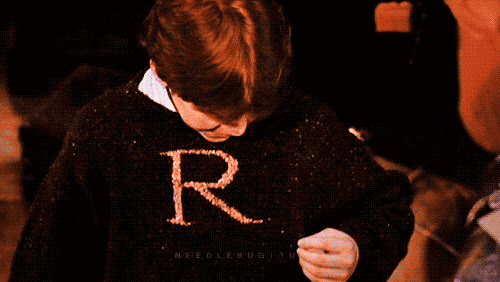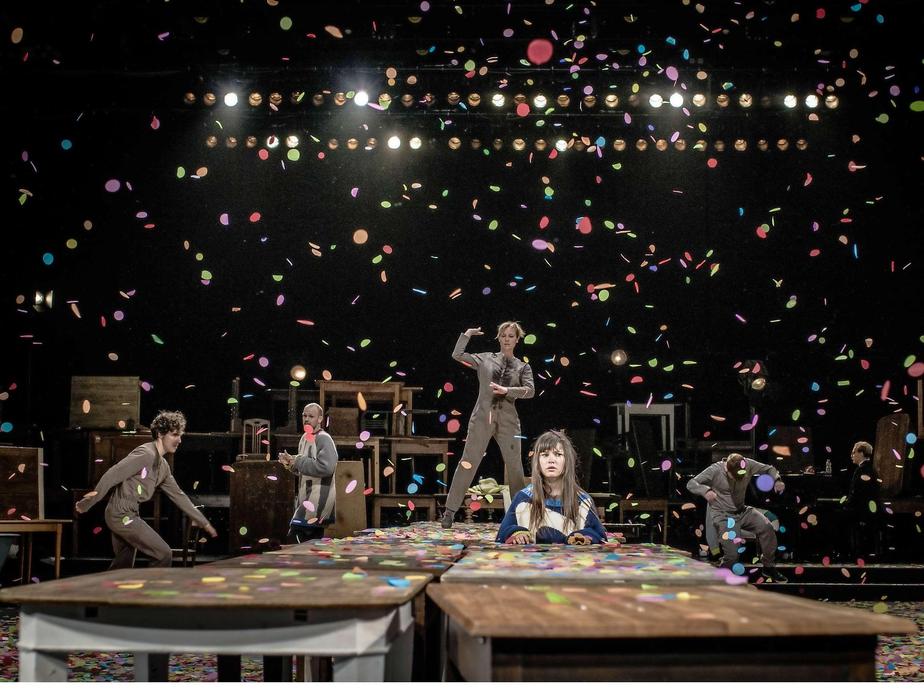Wobbling out of “Das Fest,” all I can see is a swirl of red and yellow and blue and green. This image—endless confetti, showering onto the stage—is a stunning one, like cherry blossoms suddenly loosed by a springtime windstorm. And it happens at least four or five times during Christopher Rüping’s adaptation of Thomas Vinterberg’s 1998 film, the urtext of the Dogme 95 movement. (English speakers know the film as “The Celebration.”) By the end of the evening, the confetti on the stage is nearly ankle-deep.
Is it perverse for this story—in which a father, at his 60th birthday party, is publicly outed as having molested his children—to traffic in such glorious images? Does it stifle or even trivialize the serious issues?

Nah. I wouldn’t want an after-school special on sexual abuse. And Vinterberg’s film already serves up serious moral reckoning, so a stage adaptation—and there have been many, including one by Michael Thalheimer invited to Theatertreffen in 2001—needn’t do that.
What’s frustrating about the confetti (and the hyperkinetic stage antics, and the intentionally embarrassing musical numbers, and the dumb jokes) is that it all starts to feel blazingly obvious.
As in:
Eureka, I’ve got it! Let’s juxtapose the ickiness of incest with clouds of confetti!
And:
Oh, and won’t it be clever to use all this whiz-bang stage magic to adapt a film that shirks all special effects and gimmicks?!
It’s not all misguided. Rüping keeps the key points of the film—eldest brother Christian’s speech about the father’s transgressions, sister Linda’s wrenching suicide note, mother Else’s backhanded praise of her children—but also busts it apart, turning a chamber piece into a hyperactive, opera-sized slumber party. The six performers wear gray footie pajamas, looking like children ready for bed. An early comic sketch involves a prehistoric ancestor in leopard-print underwear, and there’s later a feathered headdress that’d be at home in a school play. (“Atlas der abgelegenen Inseln” also featured men’s underpants and a feathered headdress.) One actor does a backflip. The confetti falls. The excess throws you off-kilter.
Adding to the disorientation is the fact that the actors don’t have fixed parts. Instead, they don oversized sweaters, marked with the first letter of a character’s name, to inhabit a role.
Hang on, can I talk about these sweaters for a sec? After the show, I heard some complaints about their ugliness. I beg to differ. While far from fab, these specimens fall short of true hideousness. No one at an ugly sweater party would be impressed. They’re more like something no one’s grandmother knits for them anymore. I can also imagine them keeping the Weasleys warm during long Hogwarts winters.

And there’s not just one sweater for each character, meaning several actors might play Christian at the same time. At one point, all three siblings crawl into the same sweater.
As you might imagine of a garment that accommodates three actors, the sweaters are quite stretchy. Shout-out to “John Gabriel Borkman,” which also boasted a very stretchy sweater. And a bathtub. And children acting like adults. And intimations of incest. Scandinavia, do we need to talk?
Song-and-dance breaks jostle for space amid the narrative: There’s a great „Soul Train“-style catwalk scene and a very jarring Cat Stevens rendition. Water fights leave the actors sopping. More confetti falls.
But eventually, it becomes formulaic. We anticipate the next confetti shower, the next off-color joke. And that means “Das Fest” never achieves transgression or real depth. Or, frustratingly, ambiguity—which seems like should be central to a story about an incomprehensible crime. Instead, it all makes so much sense: the gaiety against the gruesome subject matter, the theatrical razzle-dazzle against the austerity of Dogme.
Bedtime, kids. Party’s over.
Das Fest
nach dem Film von Thomas Vinterberg und Mogens Rukov
Bühnenfassung von Bo hr. Hansen, in der Übersetzung von Renate Bleibtreu
Regie: Christopher Rüping
Dramaturgie: Bernd Isele
Mit: Maja Beckmann, Paul Grill, Pascal Houdus, Matti Krause, Svenja Liesau, Christian Schneeweiß, Norbert Waidosch (Pianist)
